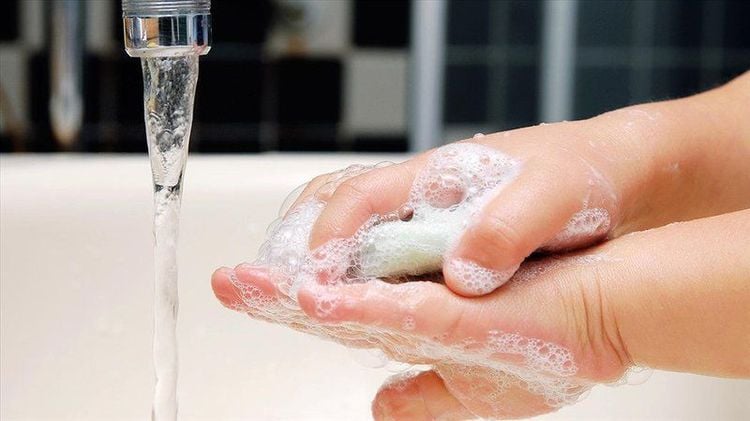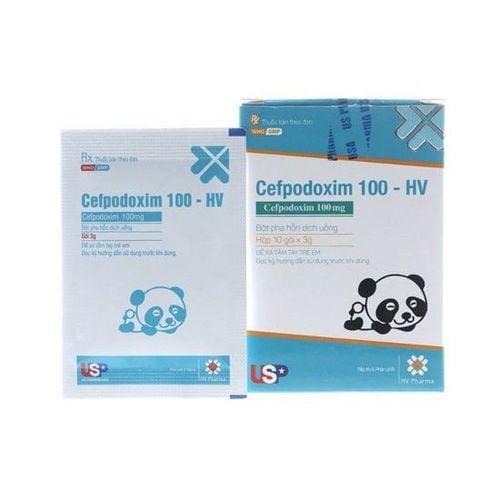This is an automatically translated article.
A sore throat caused by a virus usually goes away on its own after a few days and you don't need to worry too much. However, children with a sore throat will feel extremely uncomfortable when swallowing food, along with a burning sensation.
1. Causes of sore throat in children
There are many causes of sore throat in children, here are some common causes of sore throat in children:
The most common cause is the flu virus. Leukemia, measles, chickenpox, and diphtheria viruses can also cause sore throats in babies. Even if your baby is diagnosed with tonsillitis , it is also because the excess flesh on the sides of the baby's nasopharynx is infected with a virus or bacteria. Among bacteria, streptococcus infection is the main culprit causing sore throat. Hand-foot-and-mouth disease or gingivitis can also cause a child's sore throat. Air-borne allergens such as cigarette smoke, pet dander, dust, pollen, plants, etc. can easily lead to rhinitis, fever, sore throat and unpleasant symptoms similar to colds. . Frequently opening your mouth while sleeping also makes your throat dry and difficult to swallow. In this case, your baby may complain of pain after waking up but will feel better after drinking some water. Bacterial infections can spread and damage other parts of a child's body if left untreated. Accordingly, parents need to take the baby to medical facilities if there is an infection and there is a risk of spreading, affecting other parts of the body. Parents should pay special attention to the following symptoms in their children:

Trẻ em bị đau họng thường do virus cảm cúm
Throat infection: throat has signs of redness, swelling, or white spots Difficulty swallowing, not opening your mouth wide or breathing difficulty Stiff neck Signs of dehydration Fever over 39 degrees C Anorexia Irritability, irritability
2. Sore throat in children need to go to the emergency room?
Cases of sore throat in children requiring emergency care are very rare. However, for cases of epiglottitis, it is necessary to receive emergency treatment promptly. However, this disease is now very rare because there is a Hib vaccine. Infection of the nasopharynx makes breathing and swallowing difficult.
Children with epiglottitis often have a low-grade fever (about 38 degrees Celsius), wheeze and often drool. If your child has any of these symptoms, consult your doctor right away. If the child shows signs of difficulty breathing, immediately take the child to the emergency room.
In case the child is suspected of having epiglottitis, you should note:
Keep the child sitting upright Do not arbitrarily check the child's throat Do not feed the child because it will make it more difficult for the child to breathe
3. How to take care of a child with a sore throat?
For cases of viral infections, you do not need to be too worried because the child's immune system will automatically fight off the virus within a week. The only thing you need to do is give your baby a break and drink lots of water.
Your baby may need a simple throat biopsy if the doctor suspects a bacterial infection. The test results will be available in 10 minutes, if the results are negative, the sample is usually sent for testing again for the most accurate results after up to 2 days.
If your baby has a bacterial infection like strep, the doctor will prescribe an antibiotic. Accordingly, parents need to have their children take the full dose of medicine according to the doctor's instructions, avoid stopping antibiotics too soon, otherwise the bacteria will recover and quickly reappear in a more dangerous form.
If your baby's infection is getting worse, you may need to keep him or her in the hospital for a few days for special treatment and fluids.
4. Is sore throat in children contagious?

Bạn nên cho bé rửa tay thường xuyên với xà phòng để đề phòng bệnh
Viral and bacterial infections are highly contagious. You and your baby need to wash your hands often with soap, do not share cups, personal items and toothbrushes. Besides, you also need to ask the doctor when your baby can return to normal activities or school. In the case of a bacterial infection, your baby must rest for at least 24 hours after taking antibiotics.
5. Remedies to help relieve sore throat in children
Warm drinks like honey tea will help ease the pain and make your baby more comfortable. Cold apple juice, ice cream, or an ice cube can also help. Many people think that oranges and lemons will help children get well quickly because they will help increase their resistance, but in fact, this kind of water will cause the baby's neck to burn.
If your child is of school age, practice gargling with warm salt water diluted. Older babies can take extra sore throat tablets.
You pay attention not to let the child get dehydrated, especially when there is a fever. Although your baby will have some difficulty swallowing because it will cause pain, you need to give him plenty of fluids to recover quickly.

Uống trà mật ong giúp làm dịu cơn đau và khiến bé dễ chịu hơn
If in case the child feels uncomfortable, you can give the child acetaminophen or ibuprofen for children, you need to carefully read the dosage instructions before use. Do not give aspirin to children, because this medicine can cause Reye's syndrome (swelling of the brain and liver) which is rare but extremely dangerous.
You can buy a cooling mist or a humidifier for the bedroom to relieve sore throat symptoms. However, you need to pay attention to cleaning the filters, because if not cleaned, bacteria will easily spread through the air.
Sore throat in children in some cases can go away on their own, however, if they see signs of dangerous illness, parents need to take the child to a medical center for examination and treatment, to avoid Dangerous complications can occur.
In addition, in order to prevent diseases that young children often get, parents should pay attention to nutrition to improve children's resistance. At the same time, add supporting foods containing lysine, essential micro-minerals and vitamins such as zinc, chromium, selenium, B vitamins,... snacks and less digestive problems.
Parents can learn more:
Why do you need to supplement Lysine for your baby?
The role of zinc - Guidelines for reasonable zinc supplementation
Please visit the website Vinmec.com regularly and update useful information to take care of your baby and family.
Reference source: babycenter.com













